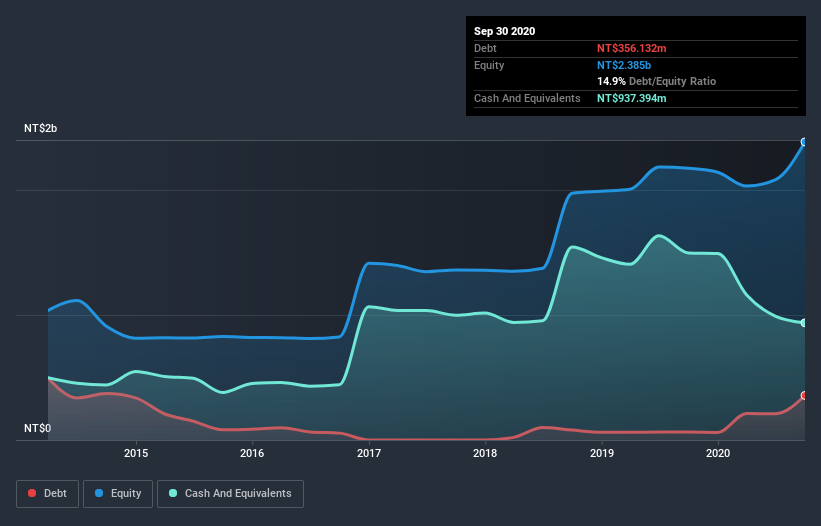- Taiwan
- /
- Electronic Equipment and Components
- /
- TWSE:6283
Health Check: How Prudently Does Shun On Electronic (TPE:6283) Use Debt?
Howard Marks put it nicely when he said that, rather than worrying about share price volatility, 'The possibility of permanent loss is the risk I worry about... and every practical investor I know worries about.' It's only natural to consider a company's balance sheet when you examine how risky it is, since debt is often involved when a business collapses. We can see that Shun On Electronic Co., Ltd. (TPE:6283) does use debt in its business. But is this debt a concern to shareholders?
When Is Debt A Problem?
Generally speaking, debt only becomes a real problem when a company can't easily pay it off, either by raising capital or with its own cash flow. Ultimately, if the company can't fulfill its legal obligations to repay debt, shareholders could walk away with nothing. While that is not too common, we often do see indebted companies permanently diluting shareholders because lenders force them to raise capital at a distressed price. By replacing dilution, though, debt can be an extremely good tool for businesses that need capital to invest in growth at high rates of return. The first step when considering a company's debt levels is to consider its cash and debt together.
View our latest analysis for Shun On Electronic
What Is Shun On Electronic's Net Debt?
You can click the graphic below for the historical numbers, but it shows that as of September 2020 Shun On Electronic had NT$356.1m of debt, an increase on NT$63.3m, over one year. But it also has NT$937.4m in cash to offset that, meaning it has NT$581.3m net cash.

How Strong Is Shun On Electronic's Balance Sheet?
The latest balance sheet data shows that Shun On Electronic had liabilities of NT$784.8m due within a year, and liabilities of NT$278.5m falling due after that. On the other hand, it had cash of NT$937.4m and NT$547.8m worth of receivables due within a year. So it actually has NT$422.0m more liquid assets than total liabilities.
This surplus suggests that Shun On Electronic has a conservative balance sheet, and could probably eliminate its debt without much difficulty. Simply put, the fact that Shun On Electronic has more cash than debt is arguably a good indication that it can manage its debt safely. There's no doubt that we learn most about debt from the balance sheet. But you can't view debt in total isolation; since Shun On Electronic will need earnings to service that debt. So if you're keen to discover more about its earnings, it might be worth checking out this graph of its long term earnings trend.
Over 12 months, Shun On Electronic reported revenue of NT$1.5b, which is a gain of 27%, although it did not report any earnings before interest and tax. Shareholders probably have their fingers crossed that it can grow its way to profits.
So How Risky Is Shun On Electronic?
Statistically speaking companies that lose money are riskier than those that make money. And we do note that Shun On Electronic had an earnings before interest and tax (EBIT) loss, over the last year. Indeed, in that time it burnt through NT$119m of cash and made a loss of NT$45m. With only NT$581.3m on the balance sheet, it would appear that its going to need to raise capital again soon. Shun On Electronic's revenue growth shone bright over the last year, so it may well be in a position to turn a profit in due course. Pre-profit companies are often risky, but they can also offer great rewards. There's no doubt that we learn most about debt from the balance sheet. However, not all investment risk resides within the balance sheet - far from it. Case in point: We've spotted 1 warning sign for Shun On Electronic you should be aware of.
If, after all that, you're more interested in a fast growing company with a rock-solid balance sheet, then check out our list of net cash growth stocks without delay.
If you decide to trade Shun On Electronic, use the lowest-cost* platform that is rated #1 Overall by Barron’s, Interactive Brokers. Trade stocks, options, futures, forex, bonds and funds on 135 markets, all from a single integrated account. Promoted
New: Manage All Your Stock Portfolios in One Place
We've created the ultimate portfolio companion for stock investors, and it's free.
• Connect an unlimited number of Portfolios and see your total in one currency
• Be alerted to new Warning Signs or Risks via email or mobile
• Track the Fair Value of your stocks
This article by Simply Wall St is general in nature. It does not constitute a recommendation to buy or sell any stock, and does not take account of your objectives, or your financial situation. We aim to bring you long-term focused analysis driven by fundamental data. Note that our analysis may not factor in the latest price-sensitive company announcements or qualitative material. Simply Wall St has no position in any stocks mentioned.
*Interactive Brokers Rated Lowest Cost Broker by StockBrokers.com Annual Online Review 2020
Have feedback on this article? Concerned about the content? Get in touch with us directly. Alternatively, email editorial-team (at) simplywallst.com.
About TWSE:6283
Shun On Electronic
Primarily manufactures and sells computer components in Taiwan and internationally.
Excellent balance sheet and slightly overvalued.
Similar Companies
Market Insights
Weekly Picks


Crazy Undervalued 42 Baggers Silver Play (Active & Running Mine)


Fiducian: Compliance Clouds or Value Opportunity?

Willamette Valley Vineyards (WVVI): Not-So-Great Value
Recently Updated Narratives


ADNOC Gas future shines with a 21.4% revenue surge

Watch Pulse Seismic Outperform with 13.6% Revenue Growth in the Coming Years

Significantly undervalued gold explorer in Timmins, finally getting traction
Popular Narratives


MicroVision will explode future revenue by 380.37% with a vision towards success


NVDA: Expanding AI Demand Will Drive Major Data Center Investments Through 2026





